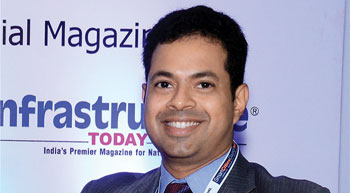Gautam Balakrishnan, Vice President and Head-Smart Cities Business, Tata Projects Ltd, believes that city corporations can leverage their data bank into a continuous revenue stream.
How important is data assimilation, and turning the same into a common source of information for better city management?
Since cities have been administered manually, it is difficult for city administrators to be present at every single asset owned by city corporations physically. But there is a solution to this challenge. If a city decides to geo-tag all its assets, accumulating all the necessary information at a single location where it can be monitored through IoT (Internet of Things), then the city will witness a different kind of experience. What I mean to say is, the citizens will witness better a complaint management and redressal system. Going further, through IoT, the city will arrest asset leakages etc.
Can you expand more on this topic?
In today’s time, most departments related to utility services work in silos. However, all can be synchronised given a platform where they can manage and monitor city assets from a single location and rectify the issues that can crop up.
A city administrator can monitor a water-leakage system, which may be losing 4,000 litres a minute, and avert any mishap. But if the same monitoring cannot happen manually, before the information reaches from one point to another, the city could have lost millions of gallons of water. Now, that’s a clear wastage of natural resources. The water wastage can be averted with the help of IoT, where on a real-time basis, city officials identify the leakage, inform concerned officials and resolve the issue with minimum damage.
With the help of our IoT offerings, we are enabling city commissioners and responders to be able to run their cities in the most efficient and optimal manner. Importantly, data plays an important role in managing cities. As we speak, we have been engaged with at least 15 cities, in providing our services which accumulate data for better city administration.
How, with the help of data, can municipal corporations increase their revenues?
There are many ways to utilise data and enhance revenue generation. In my previous example I spoke about water leakages. When a city prevents such leakages, it indirectly enhances the revenue because it is averting greater damages. Now day, cities in India are looking to monetise data that they have with them in a way that will benefit the city and add an additional stream to their treasury. In many cases the data is much more valuable than the investment itself. One can invest Rs 200 crore and get Rs 500 crore back in just five years.
For example: a city has data on traffic movement. If the same data is shared with privately operated taxi and e-commerce companies, it will be a great revenue generation stream for city corporations as such data is available only with them. Now, herein lies a catch. Such informative data coupled with analytic tools can do wonders for cities and citizens. With data and analytic tools, a city can manage its traffic flow efficiently.
For instance, if all delivery vehicles only take a left turn, skipping all the right turns on a given day, the privately held company can save as much as 2.5 hours of time a day and 3.5 million litres of fuel a month, on an average. These numbers are hypothetical, and depend on the number of vehicles a delivery company owns.
All a company has to do is enforce a route plan that will take only a left turn.
– RAHUL KAMAT



Leave a Reply
You must be logged in to post a comment.